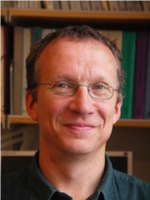About the Authors

Jakob Nordström
Assistant Professor
KTH Royal Institute of Technology
Stockholm, Sweden
jakobn[ta]kth[td]se
www.csc.kth.se/~jakobn
Assistant Professor
KTH Royal Institute of Technology
Stockholm, Sweden
jakobn[ta]kth[td]se
www.csc.kth.se/~jakobn
Jakob Nordström
received his Master of Science in Computer Science and Mathematics from
Stockholm University
in 2001, and his Ph.D. in Computer Science from
KTH Royal Institute of Technology
in 2008, where he was advised by Johan Håstad. During the academic years
2008-09 and 2009-10 he was a postdoctoral researcher at the
Massachusetts Institute of Technology (MIT).
Since 2011 he is an Assistant Professor at the
School of Computer Science and Communication
at KTH.
So far, he has worked mostly on proof complexity and on questions
at the intersection of proof complexity and SAT solving.
In 1997-1998, Jakob served as a military interpreter at the Swedish Armed Forces Language Institute (Försvarets tolkskola). In parallel with his studies and later his research, he has worked as a Russian interpreter, engaged among others for His Majesty the King of Sweden and the Swedish Prime Minister. He also has a Diploma in Choir Conducting with extended Music Theory from the Tallinn Music Upper Secondary School, Estonia. During the period 1994-1999, he was the artistic director of Collegium Vocale Stockholm, a vocal ensemble performing mainly Renaissance and Baroque music.

Johan Håstad
Professor
KTH Royal Institute of Technology
Stockholm, Sweden
johanh[ta]kth[td]se
www.csc.kth.se/~johanh
Professor
KTH Royal Institute of Technology
Stockholm, Sweden
johanh[ta]kth[td]se
www.csc.kth.se/~johanh
Johan Håstad
received his Bachelor of Science from
Stockholm University
in 1981, his Master of Science
from
Uppsala University
in 1984 and his Ph.D. from
MIT
in 1986 under the supervision of Shafi Goldwasser.
Johan was appointed Associate Professor at
KTH Royal Institute of Technology in Stockholm, Sweden,
in 1988 and was promoted to Professor in 1992.
He ha been a member of the
Swedish Royal Academy of Sciences
since 2001. He has research interests within several
subareas of the Theory of Algorithms and Complexity theory but has,
in recent years, mainly focused on the inapproximability of
NP-hard optimization problems.
